
JumpStart Games, Inc., formerly Knowledge Adventure, Inc., was an American edutainment video game company based in Torrance, California. Founded in 1991, it was acquired by Chinese holding company NetDragon Websoft in 2017.
JumpStart is an educational media franchise created for children, primarily consisting of educational games. The franchise began with independent developer Fanfare Software's 1994 video game JumpStart Kindergarten. The series was expanded into other age groups and beyond games to include workbooks, direct-to-video films, mobile apps, and other media under the ownership of Knowledge Adventure, which later assumed the name JumpStart Games.
The Learning Company (TLC) was an American educational software company founded in 1980 in Palo Alto, California and headquartered in Fremont, California. The company produced a grade-based line of learning software, edutainment games, and productivity tools. Its titles included the flagship series Reader Rabbit, for preschoolers through second graders, and The ClueFinders, for more advanced students. The company was also known for publishing licensed educational titles featuring characters such as Arthur, The Powerpuff Girls, SpongeBob SquarePants or Sesame Street.

The Blaster Learning System is an educational video game series created by Davidson & Associates and later published by JumpStart after the two companies were acquired and merged by CUC Software. The games primarily focused on mathematics, later expanding into language arts and science, and spawned an animated children's television series in 1999 called Blaster's Universe.

Living Books is a series of interactive read-along adventures aimed at children aged 3–9. Created by Mark Schlichting, the series was mostly developed by Living Books for CD-ROM and published by Broderbund for Mac OS and Microsoft Windows. Two decades after the original release, the series was re-released by Wanderful Interactive Storybooks for iOS and Android.
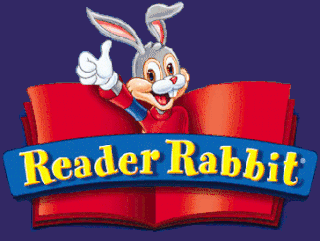
Reader Rabbit is an educational video game franchise created in 1984 by The Learning Company. The series is aimed at children from infancy to the age of nine. In 1998, a spiritual successor series called The ClueFinders was released for older students aged seven to twelve.
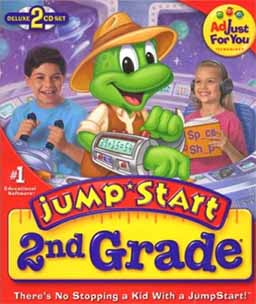
JumpStart 2nd Grade is a video game released on 26 March 1996 by Knowledge Adventure. As its name suggests, it was made to teach second grade students. It was replaced by JumpStart Advanced 2nd Grade in 2002.
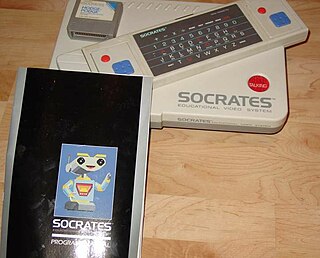
An educational video game is a video game that provides learning or training value to the player. Edutainment describes an intentional merger of video games and educational software into a single product. In the narrower sense used here, the term describes educational software which is primarily about entertainment, but tends to educate as well and sells itself partly under the educational umbrella. Normally software of this kind is not structured towards school curricula and does not involve educational advisors.
There have been a variety of Sesame Street video games released for video game platforms. Most of the Sesame Street video games were published and developed by NewKidCo.
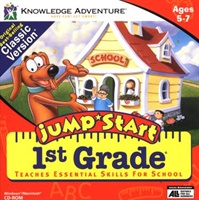
JumpStart 1st Grade is a personal computer game created by Knowledge Adventure in 1995 intended to teach a first grade curriculum. It was reissued in 1999 with new box art, was updated significantly in 2000, and was replaced with JumpStart Advanced 1st Grade in 2002, which was later replaced with JumpStart 3D Virtual World: Trouble in Town. The original 1995 version was the first appearance of Frankie, a brown, anthropomorphic dachshund dog who would go on to become the mascot of the JumpStart series.

Disney's Animated Storybook is a point-and-click adventure interactive storybook video game series based on Walt Disney feature animations and Pixar films that were released throughout the 1990s. They were published by Disney Interactive for personal computers for children ages four to eight years old. Starting from 1994, most of the entries in the series were developed by Media Station. They have the same plots as their respective films, though abridged due to the limited medium.
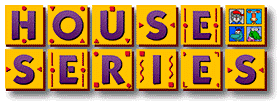
Early Learning House or simply the House Series is a collection of four main educational video games and two compilations for the Windows and Macintosh platforms, developed by Theatrix Interactive, Inc. and published by Edmark software. Each different game focuses on a particular major learning category with selectable skill settings for preschooler, kindergarten and elementary learners. Millie's Math House (1992) on mathematics, Bailey's Book House (1993) on language, Sammy's Science House (1994) on science, and Trudy's Time and Place House (1995) on history and geography. A spin-off, Stanley's Sticker Stories (1996), sees players create animated storybooks with the series' characters. Millie & Bailey Preschool and Millie & Bailey Kindergarten each contain the combined activities from two of the four software products. In addition the programs can be configured by an adult mode to suit students with special needs. Most of the activities in every game have two modes, one to allow learners to explore and try it out for themselves and the other for learners to follow specific tasks set by the game characters. Learners also have the option to print pictures of creative activities and record sounds in phonics activities. Later the games were re-developed by Houghton Mifflin Harcourt Learning Technology and re-published by The Learning Company with newer graphics and additional activities.
Madeline is a series of educational point-and-click adventure video games which were developed during the mid-1990s for Windows and Mac systems. The games are an extension of the Madeline series of children's books by Ludwig Bemelmans, which describe the adventures of a young French girl. The video-game series was produced concurrently with a TV series of the same name, with characters and voice actors from the show.
The Arthur video games franchise was a series of learning and interactive story video games based on the American-Canadian children's TV show Arthur. The games were released in the 1990s and 2000s for PlayStation and Game Boy Color alongside Windows and Mac OS computers.

Disney Learning: Winnie the Pooh comprises three titles: Winnie The Pooh Toddler, Winnie the Pooh Preschool and Winnie The Pooh Kindergarten. They are point-and-click educational video games developed and published by Disney Interactive and based on the Winnie the Pooh franchise. The titles were shipped by BAM! Entertainment.

3-D Dinosaur Adventure is an educational video game by Knowledge Adventure released on CD-ROM for MS-DOS compatible operating systems in 1993. Versions for Macintosh and Windows 3.x were published in 1996. A 1997 re-release and an updated version for Macintosh and Microsoft Windows is titled 3-D Dinosaur Adventure: Anniversary Edition.

The Mario's Early Years! series is a trilogy of point-and-click educational games released on MS-DOS and Super Nintendo Entertainment System developed and published by The Software Toolworks under license from Nintendo. The three games consist of Fun with Letters, Fun with Numbers and Preschool Fun.

JumpStart Preschool is a 1995 educational video game and third installment of the JumpStart franchise by Knowledge Adventure, after JumpStart Kindergarten (1994) and JumpStart 1st Grade (1995). It would later be re-released as JumpStart Preschool in August 1998 and superseded by a new title JumpStart Advanced Preschool in 2002. It is also known as Jump Ahead Preschool in Europe.
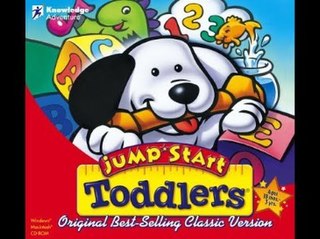
JumpStart Toddlers is a 1996 educational video game and the fourth within the JumpStart franchise. An enhanced version was released in 2000.














